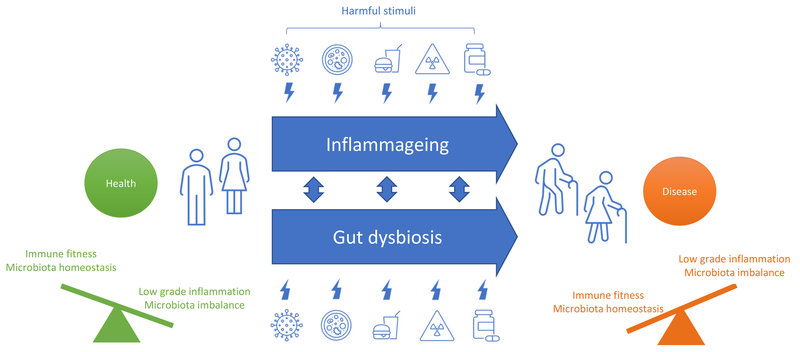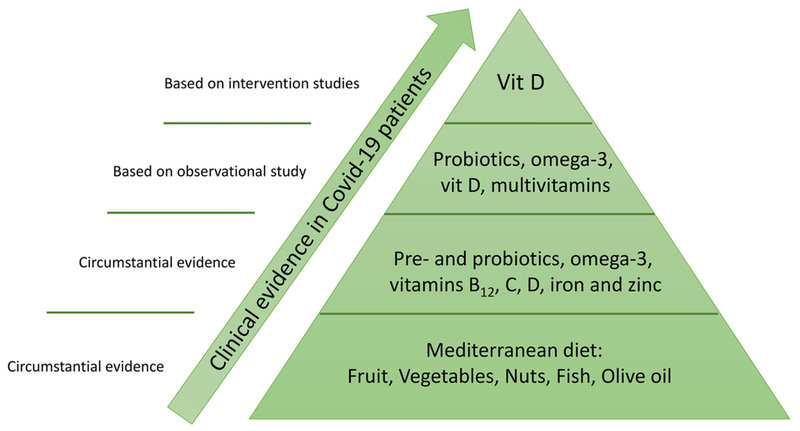NUTRITION, AGEING
AND COVID-19:
LATEST SCIENTIFIC
INSIGHTS
HEALTHY AGING

Since the start of the pandemic in December 2019, coronavirus SARS-Cov2 has killed 2.7 million people and infected at least 123 million people worldwide1. The population most vulnerable are seniors, especially those who are obese and/or have an underlying disease like diabetics or cardiovascular disease.
Why are they so susceptible to COVID-19 and what do they have in common? This as yet isn’t completely clear. However, it seems seniors with/without the abovementioned disease suffer from an ongoing low grade inflammatory process (called inflammaging) and a gut microbiota disbalance, which unravels potential targets for prevention or treatment.
Therefore, the main objective of this paper is to explore seniors’ increased vulnerability to COVID-19 in terms of the function of their aged immune system (inflammaging) and their gut microbiota imbalance, and to suggest a few ways to intervene in order to lower the risk of coronavirus infection in seniors with or without underlying disease.
The latest science suggests that interventions with probiotics, omega-3, vitamin D and multivitamins, that target these mechanisms, might be successful.
INTRODUCTION
The world is rapidly ageing. One in five people worldwide will be over 60+ in 2050. Although we all live longer nowadays, unfortunately the quality of life as we age hasn’t improved in recent years. The prevalence of diseases like heart disease, arthritis and osteoporosis are still very high in senior people which drastically impacts their mobility and quality of life. Also the susceptibility to infection increases with age. Therefore, developing and promoting adequate nutrition for the senior people is extremely important in order to help them maintain health for as long as possible.
AGEING POPULATION
SANDRA EINERHAND
Einerhand Science & Innovation | The Netherlands

Bio...

Since 2015, Sandra Einerhand heads Einerhand Science & Innovation, a consultancy providing nutritional solutions to the food and dietary supplements industry. In 2020, Einerhand Science & innovation won the Luxlife Food and Drink award for being the best European Early Life Nutrition Consultancy. In March 2021, Sandra Einerhand had the opportunity to present her company’s activities on the National TV.
Sandra also chairs the Nutrition Consultants Cooperative (NCC) and works as fellow for Presans, a Paris-based service provider in high-end open innovation. Together with her clients, Sandra creates a healthier and more sustainable environment by bringing the client’s nutrition and health products to market more efficiently, more sustainably, with benefits based on science, and with a clear nutritional story enduring success.
Before 2015, she worked for Danone Nutricia Research, Tate & Lyle Ingredients and Lipid Nutrition as Scientific Program Director and Nutrition & Health Director leading large scientific programs to bring new (natural) ingredients and (specialty) food products to the market with scientifically proven health benefits yielding several patents.
During the first part of her career, she worked as assistant (AMC, Amsterdam) and associate professor (Erasmus MC, Rotterdam) specialized in gut health and published over 100 articles in peer-reviewed journals. She studied Chemistry in Amsterdam and has a PhD in Medicine.
She has more than 20 years of experience in business-oriented research management and innovation in nutrition, gut and metabolic health.
Seniors represent the group most vulnerable to COVID-19, with underlying age-related health issues, such as hypertension, diabetes and cardiovascular disease, being risk factors that can lead to complications in the case of infection. Further, the inevitable natural deterioration of the immune system makes it harder for older adults to fight off infection. Obesity, smoking and malnutrition also weaken the immune system and are thus associated with increased risk. Generally, there are nutritional deficiencies in for instance calcium, vitamin D, folate, and zinc among the senior population. A poor nutritional status is widely considered one of the significant risk factors for severe COVID-192. According to a study in Wuhan, where the outbreak started, the prevalence of malnutrition is elevated in seniors with COVID-193.
AGEING POPULATION AND SUSCEPTIBILITY TO INFECTION
During ageing, chronic, low-grade inflammation — called inflammageing — develops, which contributes to the pathogenesis of age-related diseases. It is associated with a decline in the effectiveness of the immune system termed immunosenescence. A variety of stimuli sustain inflammageing, including viruses, pathogenic bacteria, a poor diet, psychological stress, pollutants, damaged cells or specific drugs (Figure 1). Across the lifespan, people have to constantly adapt to these harmful stimuli. The balance between pro- and anti-inflammatory parameters may shift to a more pro-inflammatory state, and, consequently, age-related diseases may emerge and ability to responds effectively to viruses and other pathogenic organisms decreases. In some COVID-19 cases the immune system even overreacts, which is known as the cytokine storm, damaging the cells more than the virus it targets.
AGEING AND INFLAMMAGEING

Figure 1. The ageing process: a lifelong adaptive response to harmful stimuli leading to inflammageing and gut dysbiosis.
The gut is a key contributor to our immunity, with more than 80% of the immune cells residing in the gut. The functioning of the immune system is closely linked to the functioning of the gut microbiota and vice versa. With age, the microbiota becomes less diverse and disbalanced. Many factors influence the microbiota including viruses, diet, pathogenic bacteria and antibiotics (Figure 1).
In seniors, a decrease in beneficial bacteria (e.g. Bifidobacteria and Bacteriodes) in the gut microbiota is observed. It is believed that perturbations in the gut microbiota in seniors trigger the innate immune response and may lead to chronic low-grade inflammation (inflammageing), leading to frailty and unhealthy aging4. This results in a microbiota that it less able to protect against pathogens, support the immune system, and digest food to supply nutrients (e.g. vitamins) and energy (e.g. short chain fatty acids) to the body. Ultimately, this leads to an increase in the transit time and constipation and susceptibility to various gut-related diseases such as gastroenteritis, infection and inflammatory bowel disease.
It is therefore not surprising that a disbalanced microbiota might increase the COVID-19 risk. COVID-19 has indeed been found to correlate to a difference in composition of the intestinal microbiota5. For instance, the anti-inflammatory bacterium Faecalibacteriumprausnitzii among others is correlating negatively with COVID-19. Furthermore, a disbalanced gut microbiota together with intestinal inflammation, increases levels of angiotensin-converting enzyme 2 (ACE2), a cell surface receptor that serves as a target of SARS-CoV-2 thereby increasing the risk of COVID-19 infection.
AGEING AND A MICROBIOTA DISBALANCE
To date, considerable evidence has demonstrated that food and nutrients affect immune system and the microbiota. Especially, the Mediterranean diet is a powerful tool to promote healthy ageing by counteracting inflammaging and stimulating a healthy microbiota. As this diet is high in vegetables, fruits, nuts, fish and olive oil, it can provide seniors with the necessary macro- and micronutrients, polyphenols, anti-oxidants, pre-, pro-, post- and synbiotics to restore and maintain immune cell function and restore the microbiota balance. Therefore, this diet is a good source of inspiration when looking at ingredients that can decrease the risk of COVID-19. Recently, several reviews have appeared describing the potential of ingredients like curcumin, lactoferrin, pre- and probiotics, omega-3, vitamins B12, C, D, and minerals iron and zinc6–14. However, very limited observational and intervention studies have been carried out in Covid-19 patients and therefore to date, the most promising candidate micronutrient is Vitamin D15,16 (Figure 2). Also emerging science indicates promises for probiotics, omega-3, and multi-vitamins17.
THE MEDITERRANEAN DIET: A RICH SOURCE OF INSPIRATION TO TARGET COVID-19 IN SENIORS?

Figure 2. Potential nutritional interventions targeting COVID-19 in seniors.
From observational studies it is clear that a poor vitamin D status in seniors prior to infection is associated with increased SARS-CoV-2 infection risk18. This is not surprising as low vitamin D status predisposes for respiratory tract infections in general. Several clinical studies on vitamin D are currently ongoing and two have been published already. One showed that a high-dose of vitamin D supplementation led to increased viral clearance indicating vitamin D had a therapeutic effect16. Another study reported that vitamin D supplementation taken during or just before COVID-19 was associated with less severe COVID-19 and better survival rate among frail elderly residents15. Therefore, Vitamin D so far seems a promising nutritional intervention (Figure 2), but future studies might have to prove more substantiation and most likely also other options for nutritional interventions.
VITAMIN D TARGETING COVID-19
Recently, a large, app-based survey among more than 300.000 UK consumers showed a modest but significant association between use of probiotics, omega-3 fatty acid, multivitamin or vitamin D supplements and lower risk of testing positive for SARS-CoV-2 in women17. The two mechanisms of actions described earlier (counteracting inflammaging and balancing the gut microbiota) may explain why the four supplements had a beneficial effect on reducing the risk of COVID-19 infection.
Probiotics are known to stimulate beneficial microbes in the gut and thereby interact with the gut-associated immune system, resulting in improved immunity and superior responses to an influenza vaccine. Omega-3s are demonstrated to be anti-inflammatory, but if they reduce the risk of SARS-CoV-2 infection is not yet clear. Multivitamins often contain micronutrients with antioxidant properties and roles in supporting the immune system. Lastly, immune cells express the vitamin D receptor and some can synthesize the active form of vitamin D.
Unfortunately, in this large observational study no clear benefits for men were observed nor any effect of vitamin C, garlic or zinc for men or women17. It is known that men are more vulnerable to COVID-19 disease than women and therefore it is tempting to speculate that higher doses might be needed or different combinations of ingredients to protect men against Covid-19. This needs further research to fully understand the reasons for the gender difference in response.
PROBIOTICS, OMEGA-3, MULTIVITAMINS AND VITAMIN D TARGETING COVID-19
Although this observational study shows promising results for the use of probiotics, omega-3, and multivitamins, so far the only food ingredient tested in clinical setting is Vitamin D making it to date the most appealing candidate for prevention and/or treatment of COVID-19. Nevertheless, several nutritional intervention studies are ongoing making it likely that other candidates might appear on the horizon soon.



